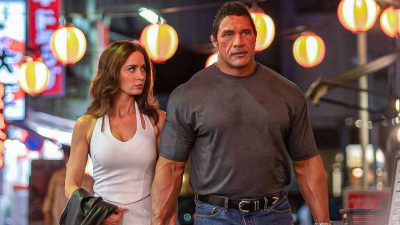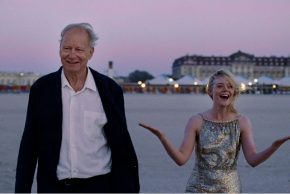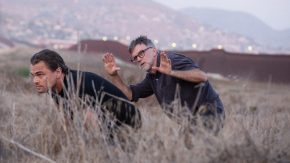Gergely Vajda, the well-known conductor and composer, has long been fascinated by Péter Esterházy’s novelette, Transporters. The composition, which lasts about an hour, was completed last year and was performed in March in a concert performance at the BMC. The chamber orchestra was conducted by the composer himself, with Anna Molnár singing the only solo role. Now the piece is coming to life again, with a staged version performed at Müpa Budapest on 21 October by the Forte Company, directed and choreographed by Csaba Horváth. Another piece, Into the little Hill by George Benjamin, will also be played alongside it.
When a composer writes an opera, the first question that arises is the choice of subject and story.
“I was looking for something that could be a mono-opera, a one-act piece, while having an inner drama that would propel the plot forward”
– says Gergely Vajda, who also wrote the libretto.
“The other reason is that I’ve loved this short novel for a long time. I have read Esterházy’s work many times and it has always touched me deeply. When you set something to music, you’re not just trying to find a subject, you’re looking for inspiration.”
Anna Molnár sang the mezzo-soprano solo role at the premiere and now. The young artist often performs contemporary works, including works by Gergely Vajda and Péter Eötvös. She was not merely selected for this role, but the part was specifically written for her by the composer. As in the classic decades of the opera genre, Gergely Vajda composed this stage ballad especially for her voice.
“From a compositional point of view, this is fortunate, since I personalise my ideas in advance, and it always turns out to be truer music than if I just think of a mezzo in general. In this case, when I write down a melody, I already hear it in her voice inside.”
The young girl at the centre of the story has been raped several times. This topic is again in the focus of public attention today, but for Vajda it did not play a role in his choice of subject; he did not want to update it. The topic is unfortunately eternal, and the novel was written in the early 1980s anyway, the first version being published in 1983. According to Vajda, in art it is only worth exploring topics about daily politics if they coincide with the interests of the artist, otherwise the work can easily become billboard-like. Many composers are also conductors. Conducting one’s own work has great advantages, but also disadvantages.
“Increasingly, I realise that this coincidence needs to be handled with care. What is obvious to me as a conductor may not be so apparent to others. Rachmaninoff, for example, had such large hands that he wrote down astonishing intervals in his piano pieces, and certainly many of his successors find difficulties in doing so. The lesson for me is that if I want a clear change of tempo or rhythm in one of my works, I have to write it down as simply and clearly as possible if I intend other performers to play my works in the way I have envisaged.”
The BMC and Müpa’s stage environments are very different, but there will probably be an even greater difference between the stage presentations. Vajda says the balladic, narrative nature of the piece makes it thrive on stage, and he is excited to see what the stage setting will bring to it.
“To immodestly compare my work to a true masterpiece, the same is true of Bluebeard’s Castle. The legendary world and the storytelling of the two characters make it suitable for a full concert experience as well. To tell the truth, I am also very curious to see what Csaba Horváth will come up with and how the piece will function on stage. Csaba and I have known each other for a long time, I’ve seen several of his productions, and in 2019, when I worked at the Armel Festival, we collaborated on his first opera production. I approached him and he jumped at the chance. The kind of total theatre he is doing is just right for these two pieces.”
In his music, Vajda quotes more music by well-known composers. He says he tried to operate this in the same way that Esterházy operates quotations in his texts. If the reader or listener recognises that it is a quotation, all kinds of associations are immediately triggered. But it’s okay if someone doesn’t recognise it. There are very obvious and hidden citations, but allusions are always a functional.
“If I take a Haydn menuette, it evokes a visit to the ‘Countess’. The great thing about music is that you can create a situation, an episode, a human character in a few seconds. It has been said somewhere that Transporters is like a miniaturised romantic novel, and my music is traditional, romantic if you like, in the sense that I always try to bring out moods, emotions and impulses, and thus drive the story forward. Concert-opera or not, music and real or imagined stage events together create the effect, which is why I am now looking forward to the stage realisation.”
In the dance genre, it is common to build a completely new piece from scratch. On the opera stage, most of the time, old works are staged with lots of stage history. That is why it is exciting to have a new work that has never been staged before. Transporters has a single singer. According to Csaba Horváth, this does not mean that it was unstaged.

“My interpretation is that Gergő Vajda contacted me because my company and I are doing a type of theatre where the physical, the storytelling with the mere human body, has a great importance. Of course, there will not only be one singer on stage, but also four actors from the Forte Company. The girl recalls the loss of her innocence, and there are several characters in this story: “the transporters” themselves, the rapists, or the mother, but also little Zsófi, who reminisces as an adult. These characters do not have their own singing voices, but they are performed by the actors. The space was designed by Zoltán Kalászi and Kristóf Kiss-Benedek, and Mari Benedek also created the costumes. Of course, there is a danger that this could turn into something of an illustrative story. The aim is not to act out exactly what Zsófi sings, but to create a parallel plane that tries to reveal the deeper layers of the story.”
Csaba Horváth simultaneously builds on the text, which is very dramatic, and on the music. He also finds the task inspiring because the music, in his opinion, fits perfectly with the text in a dramatic way. Anna Molnár, the singer, is sometimes involved in the stage play, and at other times she is accorded a distinctly distant, objective position. Whether the current performance will be the only one or whether the production will be staged somewhere else is not yet known.
Get your tickets here!
Article: Anna Rácz
Translation: Nóra Fehér

























Comments